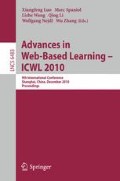Abstract
Many tools have been developed as high-level tools of Learning Design. However, few of them concern about the teacher’s perspective. This paper proposes a platform for generating online course structure adapted to teachers’ profile. Based on quantitative research, teacher’s features are observed and integrated into Unit of Learning models, and these models are presented in the platform e-Course Help, using a presentation of terms and structures distant from the IMS LD specification.
Access this chapter
Tax calculation will be finalised at checkout
Purchases are for personal use only
Preview
Unable to display preview. Download preview PDF.
References
Griffiths, D., Blat, J.: The Role of Teachers in Editing and Authoring Units of Learning using IMS Learning Design. International Journal on Advanced Technology for Learning 2(3) (2005)
Giacomini-Pacurar, E., Trigano, P., Alupoaie, S.: NetUniversité : un portail web utilisant l’IMS Learning Design. RES-ACADEMICA (Canada). In: AIPU, vol. 23(1) (2005)
Benmimoun, A., Trigano, P.: netUniversity: an Interoperable LMS/LCMS for Adaptive and Collaborative Learning. In: The 8th IEEE International Conference on Advanced Learning Technologies, ICALT, Santander, Cantabria, Spain (2008)
IMS Global Learning Consortium (May 27, 2005), http://www.imsglobal.org/learningdesign/
Ornstein, A.C.: Strategies for effective teaching, 2nd edn., vol. 41. Brown & Benchmark, Madison (1995)
Hoyt, D.P., Lee, E.J.: Teaching “Styles” and Learning Outcomes. IDEA research report, viewed on (February 2009), ED472498A unique accession number assigned to each record in the database; also referred to as ERIC Document Number (ED Number) and ERIC Journal Number (EJ Number) (2002), http://eric.ed.gov/
Pratt, D.D.: Good teaching: one size fits all? In: Ross-Gordon, J. (ed.) An Up-date on Teaching Theory. Jossey-Bass, San Francisco (2002)
Zhang, L.F.: The role of thinking styles in psychosocial development. Journal of College Student Development 43(5), 696–711 (2002)
Tennant, M.: Psychology and Adult Learning. Routledge, New York
Sternberg, R.J., Grigorenko, E.L.: Are cognitive styles still in style? American. Psychologist 52(7), 700–712 (1997)
Dewey, J.: The child and the curriculum, vol. I. University of Chicago Press, Chicago (1902); reprinted in Hickman, L. A., Alexander,T. M.(eds.) :The essential Dewey, vol. I. Indiana University Press,Bloomington (1998)
Tamura, Y.: Domain-Oriented Approach to the Reuse of Learning Knowledge: An Overview. In: 2nd ICALT (International Conference on Advanced Learning Technologies), pp. 531–533 (2002)
Myers, I.B., McCaulley, M.H.: Manual: A Guide to the Development and Use of the Myers-Briggs Type Indicator. Consulting Psychologists Press, Palo Alto (1985)
Witkin, H.A., Moore, C.A., Goodenough, D.R., Cox, P.W.: Field dependent and field independent cognitive styles and their educational implications. Review of Educational Research 47, 1–64 (1977)
Allinson, C.W., Hayes, J.: The cognitive style index: a measure of intuition-analysis for organisational research. Journal of Management Studies 33(1), 119–135 (1996)
Sternberg, R.J.: Thinking styles. Cambridge University Press, New York (1997)
Herrmann, N.: The Whole Brain Business Book. McGraw-Hill, New York (1996)
Popescu, E.: .Dynamic adaptive hypermedia systems for e-learning, PhD Thesis, University of Craiova, Romania (2008a)
Wang, K., Trigano, P.: Unit of Learning Model for LMS/LCMS Integrating Psycho-pedagogical Elements. In: Spaniol, M., Li, Q., Klamma, R., Lau, R.W.H. (eds.) ICWL 2009. LNCS, vol. 5686, pp. 410–419. Springer, Heidelberg (2009)
Wang, K.: Adaptivie Hypermedia Unit of Learning Model. Ph.D thesis of UTC (Université de Technologie de Compiègne) (2010) (in press)
Felder, R.M., Silverman, L.K.: Learning and Teaching Styles in Engineering, Education, Engineering Education, vol. 78 (7) (1988), http://www4.ncsu.edu/unity/lockers/users/f/felder/public/Papers/LS-1988.pdf ;Preceded by a preface in (2002)
Popescu, E., Trigano, P., Badica, C., Butoi, B., Duica, M.: A course Authoring Tool for WELSA Adaptive Educational System. In: ICCC 2008, pp. 531–534 (2008)
Jung, C.G.: Psychological Types. Princeton University Press, Princeton (1971)
KoIb, D.A.: Experiential Learning: Experience as the Source of Learning and Development. Prentice-Hall, Englewood Cliffs (1984)
Bayes, T.: An Essay towards solving a Problem in the Doctrine of Chances. Philosophical Transactions of the Royal Society of London 53, 370–418 (1763)
Author information
Authors and Affiliations
Editor information
Editors and Affiliations
Rights and permissions
Copyright information
© 2010 Springer-Verlag Berlin Heidelberg
About this paper
Cite this paper
Wang, Kl., Trigano, P. (2010). eCH, A Course Help Tool for Teacher. In: Luo, X., Spaniol, M., Wang, L., Li, Q., Nejdl, W., Zhang, W. (eds) Advances in Web-Based Learning – ICWL 2010. ICWL 2010. Lecture Notes in Computer Science, vol 6483. Springer, Berlin, Heidelberg. https://doi.org/10.1007/978-3-642-17407-0_29
Download citation
DOI: https://doi.org/10.1007/978-3-642-17407-0_29
Publisher Name: Springer, Berlin, Heidelberg
Print ISBN: 978-3-642-17406-3
Online ISBN: 978-3-642-17407-0
eBook Packages: Computer ScienceComputer Science (R0)

